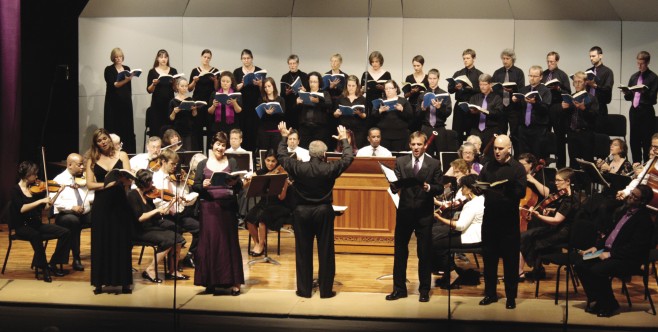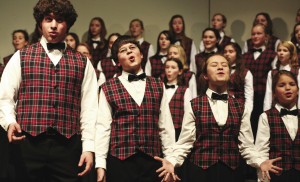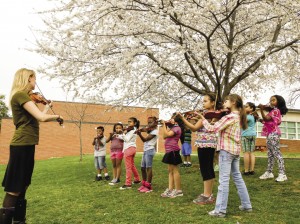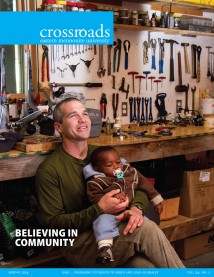
Conductor Ken J. Nafziger has been the artistic director of the Shenandoah Valley Bach Festival since its inception 22 years ago. (Photo by Jessica Roxanne Atienza)
BACH FESTIVAL
Music lovers flock to Harrisonburg each summer for the annual Shenandoah Valley Bach Festival. With a week of performances ranging from baroque to modern, amateur to award-winning, they aren’t disappointed.
The flagship performances are held in EMU’s Lehman Auditorium, but in an effort to share the experience with the widest possible audience, concerts are also held in downtown Harrisonburg venues on weekdays.
Many of the performances are free, to allow as many as possible to attend, said Mary Kay Adams, Bach Festival executive director and principal flutist. She recruits volunteers for each summer’s festival: to house traveling musicians, work as ushers for the performances, and even sing as choir members.
“The Bach Festival is one of the signature arts events in Harrisonburg every year, and adds to what is a growing and vibrant community for artists and arts enthusiasts,” says Kai Degner, Harrisonburg City Council member.
Last season, 4,000 people attended the festival. In 2014, there will be a new concerto competition for youth, for a chance to earn a spot in the opening concert. Up-to-date information can always be found at emu.edu/bach.
CHILDREN’S CHOIR

The Shenandoah Valley Children’s Choir gained a new director, Janet Hostetter ’87, after a careful sifting of dozens of applicants. (Photo by Jill Koeppen)
Whether at the White House for the lighting of the national Christmas tree, at festivals in Hawaii or in Italy, the sound of the Shenandoah Valley Children’s Choir (SVCC) blows its audiences away, assistant director Joy Anderson is pleased to say.
Now in its 22nd year, the children’s choir is open to youths aged 5-18.
They are trained to perform at the same level as nationally recognized choirs from urban areas, but their mission isn’t to compete, Anderson says.
The choir’s main goal is to instill high standards – in music and in character – in an atmosphere of cooperation, she says.
In the spring of 2014, Janet Heatwole Hostetter ’87 was named SVCC’s new artistic director, chosen from a stack of applicants from across the country and beyond. After majoring in music at EMU, Hostetter earned a master of music degree in choral conducting from James Madison University. In the spring of 2008, she served as SVCC guest director during founding director Julia White’s sabbatical.
“The SVCC, under the direction of Julia White and [interim director] Joanne van der Vat-Chromy, has brought a quality of music education to our community that has impacted the lives of many,” said Hostetter. “I am honored to have been chosen for the artistic director position and desire to continue the same level of musical excellence we have all come to enjoy.”
Combining music theory and practice in their earliest non-auditioned classes, with performing artistry from age seven and up, the choir seeks to encourage a sense of connection, pleasure and belonging alongside instruction. “It’s a rigorous program, but it’s fun,” Anderson says.
The children expand their social repertoires, too: Those who are homeschooled meet and sing alongside children from the city schools, who mingle with those from county schools, plus some from even an hour’s drive away, living in Winchester and Charlottesville. Around 150 choristers are part of the program each year, which is housed at EMU.
For more information,
visit emu.edu/svcc.
PREPARATORY MUSIC
Although part of EMU’s music department, the Shenandoah Valley Preparatory Music Program isn’t focused on grooming future music majors. “Our main goal is to give students the skills to be able to use their music in whatever setting they find themselves in the future,” said program director Sharon Miller, who teaches violin, viola and Suzuki pedagogy courses. That may be in orchestras, churches or living rooms.

Megan Tiller ’07 teaches strings at Spotswood Elementary (pictured) and Waterman Schools, as well as helping with the strings programs in other schools throughout the region. She also runs Tiller Strings, a local option for obtaining stringed instruments and accessories. (Photo courtesy of Megan Tiller)
The preparatory music program is a combination of community outreach offerings: Musikgarten for exposure from infancy to 7 years, to Youth Symphony, a high-level ensemble of high school juniors and seniors. The only program of its kind in a 60-mile radius, the program became part of EMU’s music department in 1988. It has served an average of 375 students each year.
The program’s community-building efforts continue with the Harrisonburg City Schools Strings Program, offering children an after-school opportunity for string instrument instruction that they might not otherwise have. Megan Tiller ’07, for example, is a Suzuki-trained teacher of strings at both Waterman and Spotswood Elementary schools. Since 2007, a group of highly diverse students in grades 3-8 have picked up violins and learned to play, regardless of their financial situation. The after-school program is funded in part by Harrisonburg City Schools, student tuition, and individual donations. About 150 children are in the program, 71% of whom are low-income.
In the late spring and summer, music day camps are organized for Musikgarten and Suzuki Strings.
For more information, visit
emu.edu/music/preparatory-program.
— Samantha Cole ’11
